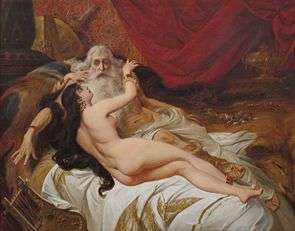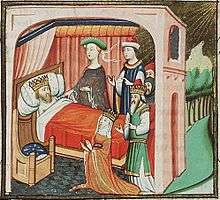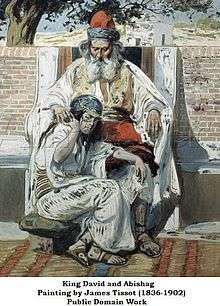Abishag
Abishag (Hebrew: אבישג Avishag) was a beautiful person of Shunem, who, when brought to David, was a na'arah, which indicates youth and/or virginity, but not necessarily both.[1][2][3] According to the Hebrew Bible, she was chosen to be a helper and servant to king David in his old age.[4] Among Abishag's duties was to lie next to David and pass along her animal heat and vigor ("they put covers on him, but he could not get warm"),[5], while not having sex with him (1 Kings 1:4).[6]



The Interpreter's Bible[7] notes that
the Hebrews...believed that the fertility of the soil and the general prosperity of the people were bound up with the fertility of the king. David by this time was old and decrepit and his sexual vigor is called into question. Attempts are made to remedy the situation. The first cure is to heap clothes upon his bed in order to secure such physical heat as might render him capable. When this fails a search is made for the most beautiful woman in the land. Great emphasis is placed upon her [Abishag's] charms. The LXX supports this by translating in vs. 2, "and let her excite him and lie with him." The fact that the king did not have intercourse with her is decisive in the story. If David was impotent he could no longer be king.
After David's death Adonijah (David's fourth and eldest surviving son), persuaded Bathsheba, king Solomon's mother, to entreat the king to permit him to marry Abishag. Solomon suspected in this request an aspiration to the throne, since Abishag was considered David's concubine[8][9], and so ordered Adonijah's assassination (1 Kings 2:17–25). In the earlier story of Absalom's rebellion, it is noted that having sex with the former king's concubine is a way of proclaiming oneself to be the new king. Adonijah may have asked to marry her at the suggestion of his mother.[6]
Some scholars point to the possibility that Abishag is the female protagonist in the Song of Songs.[10]
Later Jewish midrashic and Christian traditions paid little attention to Abishag's role.[11] Abishag's experiences have provided inspiration for contemporary writers including Rainer Maria Rilke, Itzik Manger, Louise Gluck and Shirley Kaufman.[11]
See also
References
- Lacocque, André (2015). "Jesus the Central Jew: His Times and His People". Retrieved July 12, 2019.
unable to conceive although married because she is not yet pubescent
- Benson, Joseph (1857). "Joseph Benson's Commentary of the Old and New Testaments 1 Kings 1". StudyLight.org. Retrieved July 12, 2019.
Whose natural heat is fresh and wholesome, and not impaired with bearing or breeding children
- Gill, John (1748–63). "John Gill's Commentary on Ruth 4:12". Retrieved June 2, 2020.
she was a young woman, though a widow: the Jews say she was forty years of age, as observed in (Ruth 3:10) and the elders wish and pray he might have a numerous family of the children the Lord would give him by her; and this might be the rather expected of her, as being a young woman, yet only as the gift of God, as children are, (Psalms 127:3).
CS1 maint: date format (link) - Hanks, Patrick; Hardcastle, Kate; Hodges, Flavia (2006). A Dictionary of First Names. Oxford paperback reference. Oxford University Press. p. 42. ISBN 978-0-19-861060-1. Retrieved 2018-11-17.
- Whedon, Daniel (1909). "Whedon's Commentary on the Bible". StudyLight.org. Retrieved July 12, 2019.
sleep with him, and thus communicate to him animal heat and vigour. This method of recruiting the wasted vigour of age is natural and well known; but while it benefits the old, it must needs take away from the strength of the young.
- "Abishag of Shunem (fl. 1000 bce)". Women in World History: A Biographical Encyclopedia. Gale Research Inc. Archived from the original on 13 March 2016. Retrieved 6 January 2013.(subscription required)
- Nashville:Abingdon Press, 1954
- Fleming, Donald C. (2005). "Bridgeway Bible Commentary". Retrieved July 12, 2019.
Since a new king inherited the former king's concubines, Solomon considered that Adonijah's request to marry Abishag was an attempt to claim David's throne
- Clark, Adam (1832). "Adam Clark Commentaries". Retrieved July 12, 2019.
He cheerfully gives up all right to the kingdom, and only desires to have this young woman, who, though she had been his father's wife or concubine, was still in a state of virginity.
- Christopher W. Mitchell, The Song of Songs (Saint Louis: Concordia, 2003), 130–132.
- Koplowitz-Breier (2018). "The Power of Words: The Biblical Abishag in Contemporary American Jewish Women's Poetry". Studies in American Jewish Literature. 37 (1): 21. doi:10.5325/studamerjewilite.37.1.0021. ISSN 0271-9274.
